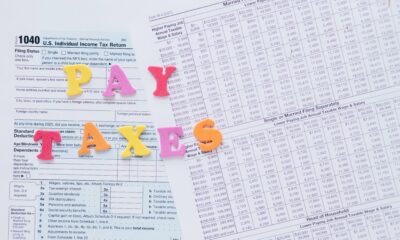Business
Income Tax Hikes Backfire: Treasury Finally Admits the Obvious

Why taxing South Africans more isn’t the fix and what the government plans instead
South Africans have long felt the pinch of rising taxes and now, National Treasury is conceding what many have known for years: hiking personal income taxes just doesn’t work the way policymakers hoped.
Faced with a gaping hole in the 2025 budget nearly R70 billion government officials are desperately seeking ways to fill the gap without reaching deeper into taxpayers’ already shallow pockets. And for once, Treasury is saying the quiet part out loud: increasing income tax won’t do the trick.
What Treasury is finally admitting
In a response to the 2025 Budget debate, Treasury reviewed proposals from economists, civil society, and business leaders, many of whom called for new income tax brackets and even a wealth tax. But the department flatly rejected the idea that taxing the rich more would save the budget.
“Previous attempts to raise income tax didn’t bring in as much as we thought,” the department admitted. “In fact, the more we raise rates, the more people find ways to avoid or evade paying altogether.”
That tracks with real-world outcomes. When government introduced a 45% tax bracket in 2017/18, hoping it would rake in more cash from high earners, it actually led to a dip in declared income. Wealthier individuals simply moved their money, changed their accounting strategies, or in some cases, left the country altogether.
Income tax isn’t the problem, it’s become the crutch
South Africa already leans heavily on personal income tax (PIT). Over the last two decades, PIT has ballooned from 6.6% of GDP in 2004 to 9.8% in 2024. That makes it one of the highest income tax burdens among developing nations.
For context, the top three income tiers alone now shoulder over 60% of all PIT—roughly R490 billion annually. Treasury’s latest figures reveal that if just 10% of these taxpayers were to pack up and move abroad, South Africa could lose R49 billion a year, not to mention all the VAT, capital gains, and property taxes they contribute.
And yes, wealthy South Africans are internationally mobile. It’s not just about patriotism—it’s about math.
Wealth tax? Been there, done that
On the issue of a wealth tax, the sentiment from Treasury is equally skeptical.
Advocates for taxing South Africa’s wealthiest argue it could generate billions. But Treasury points out that much of this wealth is already taxed—through estate duties, capital gains tax, property taxes, and even luxury goods levies.
In total, these existing taxes already bring in about R21 billion a year. Piling on another layer, Treasury argues, is unlikely to raise meaningful revenue and far more likely to trigger an exodus of high-net-worth individuals.
The VAT that wasn’t, and the hole it left
Initially, Finance Minister Enoch Godongwana floated a hike in Value-added Tax (VAT) to plug the shortfall. VAT, unlike income tax, is harder to dodge. But facing pushback from unions and civil society, the proposal was scrapped before Budget Day.
That decision left a R70 billion problem with no clear solution and for 2026, an additional R20 billion will still need to be raised through “other tax measures.”
What exactly those will be is unclear.
So where to from here?
With income tax hikes off the table and VAT politically toxic, Treasury is turning to SARS and the economy itself. The idea is simple: get more people into the tax system through compliance and job creation, instead of squeezing those already paying.
This approach has wide public support. Many South Africans feel the problem isn’t tax rates—it’s tax fairness. Too many people and businesses are simply not paying their share, while compliant taxpayers are left to carry the load.
If SARS can close the compliance gap and the economy can grow, Treasury believes it can stabilise revenue without sending more people or their money overseas.
Public sentiment: enough is enough
On social media, reactions have ranged from relief to cynical laughter. “So Treasury’s finally caught up with the rest of us,” one X (formerly Twitter) user quipped. “Took them how many years to figure out bleeding the same people won’t work?”
Others applauded the honesty but demanded action. “Saying tax hikes don’t work is a start. Now fix SARS, stop wastage, and tax the actual tax dodgers,” posted a well-followed financial analyst.
No more easy answers
Treasury’s admission marks a turning point in South Africa’s ongoing tax debate. It’s not just about how much to tax, but how smartly to do it.
If government wants to rebuild trust and raise revenue, it can’t rely on the same old tools. It must broaden the base, enforce the rules, and ensure every citizen and company pays their fair share.
Because as it turns out, taxing the few to fund the many only works, until the few walk away.
{Source: BusinessTech}
Follow Joburg ETC on Facebook, Twitter , TikTok and Instagram
For more News in Johannesburg, visit joburgetc.com



























